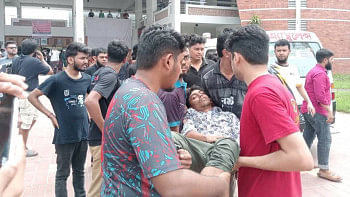HC declares new ordinance invalid
The High Court (HC) yesterday declared the new contempt of court ordinance invalid, and observed that it undermines the spirit of the constitution and independence of the judiciary.
Ruling on a writ petition challenging the legality of some provisions of the Contempt of Court Ordinance 2008, an HC bench comprising Justices ABM Khairul Haque and Md Abu Tariq also observed that the ordinance curtails the magistracy of the Supreme Court (SC).
It said when a new parliament was expected to take over within a few months it was not necessary to promulgate the ordinance replacing the Contempt of Court Act 1926.
According to the submissions made by the attorney general and deputy attorney general, the draft ordinance prepared during a political government does not seem to have been presented before the persons [legislators] who are supposed to have the final say, it continued.
“Instead, the government officials have examined the draft, and so the ordinance carries no legal basis.”
The cabinet on March 2 approved the ordinance and a gazette notification to that effect was issued on May 25.
About implications of the HC decision, barrister M Amir-Ul Islam said the ruling means reinstatement of the Contempt of Court Act 1926.
Citing article 58 (D) of the constitution, the HC said enacting a new law repealing an existing one was a policy decision and since it had nothing to do with election it was done without lawful authority.
As per the article, the caretaker government shall confine itself to discharging routine functions and tasks relating to the conduct of general election. It shall not make any policy decision except in the case of necessity.
The bench said in section 10(1) of the contempt of court ordinance public servants accused of violating the law are excused from appearing before courts and allowed to present their statements through lawyers.
“This is against article 27 of the constitution that says all citizens are equal before law. The court will determine whether a person accused will have to appear before it," it added.
The ordinance allows the press to report and comment on "normal" court proceedings and functions, or anyone to seek disciplinary proceedings against a judge as long as they are done in "good faith" and through "restrained language".
It also provides for a judge's personal conduct to be reported. It says a judgment too can be criticised as long as it is "constructive".
Referring to those provisions, the court said criticising judgments or orders of the courts with appeals against those pending at higher courts is very risky. Even if the criticisms are justified, those are against justice. Justice seekers cannot get justice from judges fearful of criticisms. Criticisms never facilitate dispensation of justice.
It added that honour of the judges should be preserved even after their retirement. "Their dignity stands for the dignity of the entire judiciary. So disrespect to them is disrespect to the judiciary."
SC lawyers Shamsul Huq and Tajul Islam filed the writ petition as a public interest litigation on June 8.
The same day an HC bench comprising Justice Syed Mahmud Hossain and Justice Farid Ahmed issued a rule asking the government to explain why some provisions of the Contempt of Court Ordinance 2008 including the ones that allow complaining about a judge and criticising judgments should not be adjudged ultra vires (without authority) of the constitution and void.
Then on July 6, during hearing on a contempt rule against 18 journalists of the weekly Shirsho Kagoj, the bench of Justice ABM Khairul Haque and Justice Md Abu Tariq issued the suo moto (on its own motion) rule on the government, asking it to explain within a week why the contempt of court ordinance should not be ruled unconstitutional.
Yesterday the HC heard both the rules before passing the verdict.
Earlier, it appointed seven legal experts as amicus curiae (friend of the court) for legal interpretations in the case. They are Mahmudul Islam, Amir-Ul Islam, Rafique-ul Huq, Ajmalul Hossain, AHM Shamsuddin Chowdhury Manik, Abdul Wadud Bhuiyan and Shahdeen Malik.
Abdur Razzak assisted by Belayet Hossain and Emran Siddique appeared for the petitioners while Attorney General Salauddin Ahmed and Deputy Attorney General Mozammel Huq stood for the government.

 For all latest news, follow The Daily Star's Google News channel.
For all latest news, follow The Daily Star's Google News channel. 



Comments